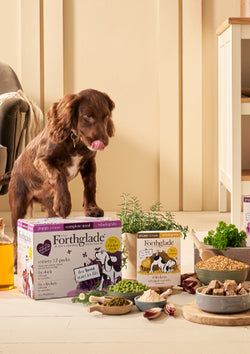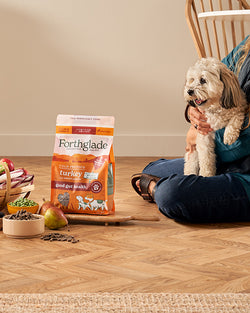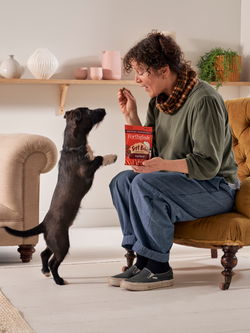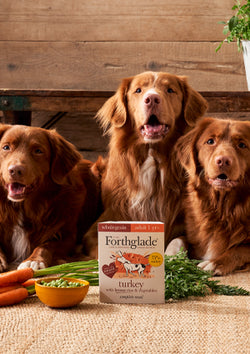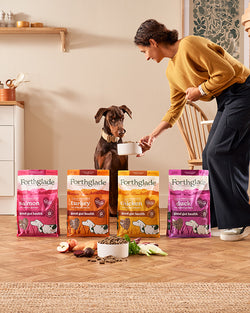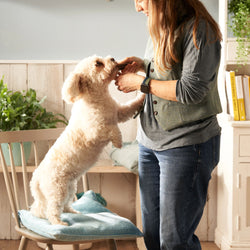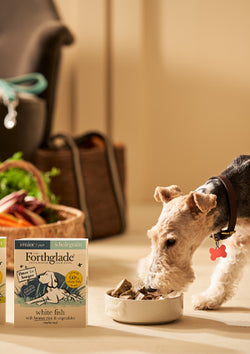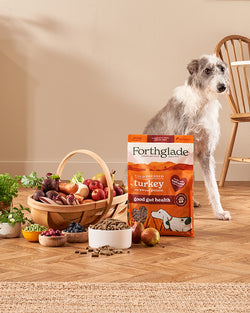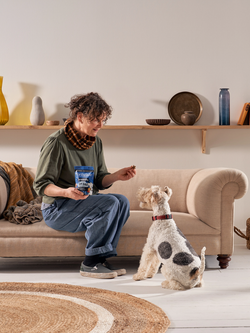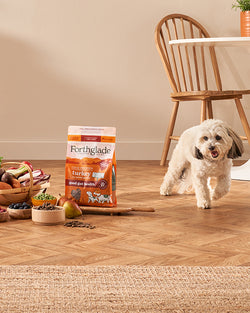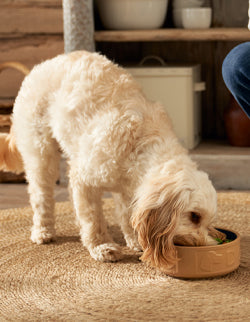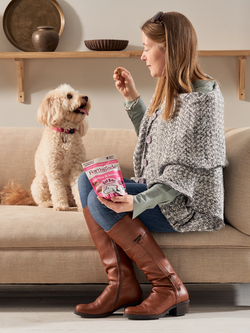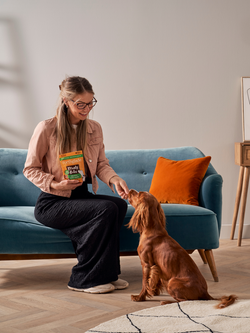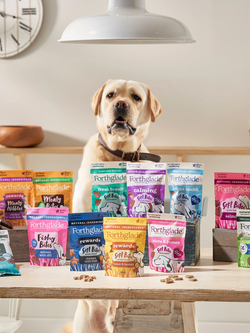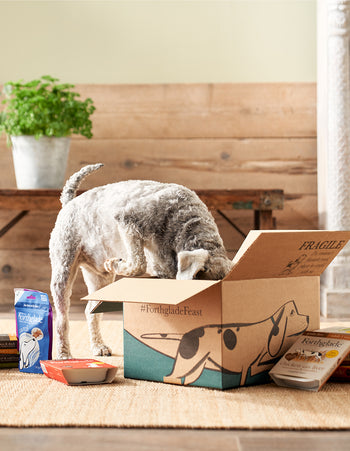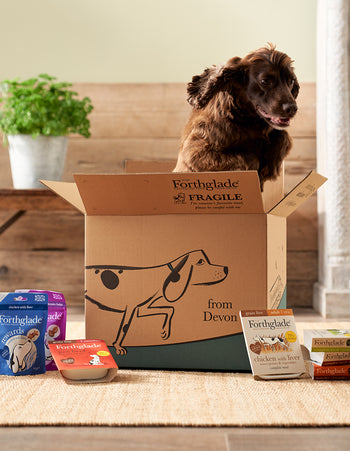As your dog gets older, you’ll want to keep them as vibrant, healthy and active for as long as you can. And with the right exercise, diet and general care, there’s no reason an older dog should reduce its zest for life.
From frequent walks through to mental stimulation with games and time adventuring together - it’s just important to understand what it is that our dog needs to stay fit and well as it starts to get a little older.
Here we take you through the varying needs of dogs as they get older and how diet can play a key role in their overall wellbeing.
When Does A Dog Become A Senior Dog?

All dogs are different so there’s no blanket answer. It depends on factors ranging from breed, size, lifestyle and in some cases any medical conditions. Older dogs may need to slow down a little, as clearly they’re not as robust as their younger peers. But remember, because so many factors vary, it’s worth asking your vet for advice on what needs are required medically first.
Size
Larger dogs tend to have shorter lives and age at a faster rate than smaller dogs. A great dane will be considered well into their golden years at the age of eight. For a tiny Yorkshire terrier, however, eight years old would be merely middle aged.
Breed
Depending on genetics, every breed has its own average lifespan. In general, the more a dog has been bred to suit human aesthetics, the lower its lifespan. A medium-sized French bulldog or a small pug may live only until about 11 or 12 years. This is because of their highly bred (but often popular) flat faces. At the other end of the spectrum, Jack Russells and border collies have the longest life expectancy of all breeds in the UK, lasting into their late teens.
Lifestyle
If your dog is active and fit, they’re likely to age more slowly. But a dog that's fed a poor diet and is not exercised enough is likely to decline more quickly once they reach their senior years.
Why Does My Senior Dog Need A Change In Diet?

As we humans get a little older, our metabolism slows down and we can gain weight more easily, even if we don’t necessarily increase our calorie intake. We have to take greater care of what we eat and how active we are. It’s the same with dogs.
Risk Of Obesity
They may seem as hungry as usual and just as excited about treats, but the older they get, the more easily they will put on weight. Coupled with lower energy levels, more downtime on the sofa and shorter walks, your older dog could run the risk of gaining weight.
Decline In Cognitive Ability
If stimulation is reduced, older dogs can have reduced cognitive ability - much like us humans. ‘Doggy dementia’ is a real thing: Canine Cognitive Dysfunction or CCD. It has similar symptoms to Alzheimer’s in humans - most often affecting memory, comprehension and the ability to learn. Your pal may bark at nothing, stare into space or seem more aloof than usual.
Seek advice from your vet if you notice any of these symptoms, as much can be done to reduce this.
Joint Pain Or Stiffness
Your dog’s joints may feel stiffer as they get a little older, so it’s worth checking with your vet if they may benefit from shorter and more frequent walks - whatever best suits their joints and bones. Inflamed joints are often simply the result of increased wear and tear due to age. It can result in limited mobility and a persuasion to a more sedentary lifestyle.
Aside from getting exercise, mental stimulation and rest all perfectly balanced for your own dog’s needs, nutrition can play a huge factor in keeping your dog happy and healthy. A nutritious diet will help their immune systems, keep joints in good working order, brains firing on all cylinders and their weight consistent. A balanced healthy diet will even help them sleep better.
It may be time to offer the best senior dog food you can find, which will have a lighter-fat recipe, lots of fibre, fish oils and extra nutritional supplements. It may also be time to review what type of treats are shared with them. Go for natural treats with added glucosamine to help with their joints, and free from any nasties.
What Are The Benefits Of Forthglade’s Senior Dog Food?

1. Natural And Delicious
The best senior dog food is specifically tailored to older dogs, typically aged seven years-plus. At Forthglade, we believe the need for nature is just as important as your dog grows older. So, all our senior dog food is made from natural ingredients, bursting with goodness and packed full of flavour. It’s also gently steamed to retain as much goodness as possible.
2. Lighter And Easy To Digest
Our senior dog food recipe is lighter, with 60% protein compared with our standard adult equivalent. We add butternut squash, which has a low-energy density, is high in antioxidants and great for your dog’s digestion.
We also do a wholegrain recipe, with lamb and brown rice, which is easily digestible. No excessive weight gain and no stomach upsets.
3. Great For Sensitive Tummies
Looking for grain-free senior dog food? We make the best senior dog food for sensitive stomachs. Our grain-free recipe makes it easier to digest, which is ideal for sensitive tummies. We also add chicory root extract – a prebiotic that helps your older dog maintain a healthy digestion.
4. Nutritionally Balanced
There are lots of added vitamins and minerals, helping your dog stay fitter for longer. Salmon oil delivers omega 3, which helps maintain cognitive function. Higher levels of chondroitin and glucosamine help support joints and bones.
5. Easy To Swallow
Older dogs may have greater difficulty chewing or swallowing. We have formulated the best senior wet dog food UK for your aging pal. Wet food also smells stronger, tempting your older dog, whose sense of smell and taste may have declined.
Which Conditions Might Senior Dog Food Help?
-
Arthritis
Arthritis may affect your dog’s joints as they get older. Senior dog food with added glucosamine can help alleviate the pain of stiff, aching joints, enabling your dog to get around more easily. Salmon oil is good for joints too.
-
Skin Issues
An older dog may start to lose their fur or develop skin complaints. A senior dog food with higher levels of omega 3 will promote supple skin and a glossy coat as well as helping to manage auto-immune conditions.
-
Dental Problems
Your older dog may develop dental issues such as sensitive gums and require softer foods as they hit senior years. Switch to the best wet dog food for senior dogs and let your old dog eat with ease, even with missing teeth. And it’s never too late to introduce dental sticks and gentle toothbrushing.
-
Obesity
Older dogs are the most susceptible to the many health issues that obesity can contribute to, including diabetes, arthritis and urinary tract problems.
How Do I Make The Transition To Senior Dog Food For My Dog?
The best thing you can do for your older friend is keep an eye on their weight and keep up with those regular visits to the vet. If any medical changes arise because your dog is getting older, your vet will help guide you to making the decision to switch dog foods.
Once you’ve decided to make the change, gradually add more of their new senior dog food to their bowl and less of their old food over a period of seven to 10 days.
Now you know what to look out for, browse our all-natural, delicious and healthy range of senior dog food to help work out what’s best to keep a spring in your older dog’s step..






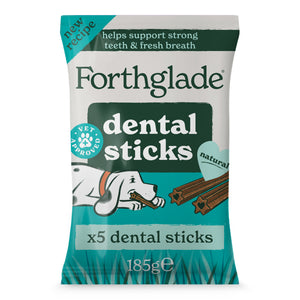

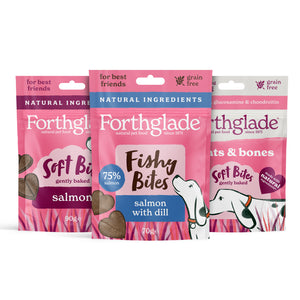
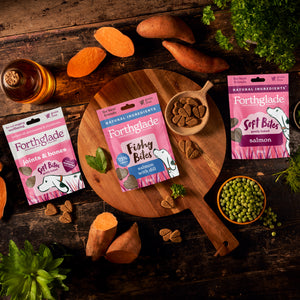


 FAST & FREE DELIVERY ON ORDERS £40+*
FAST & FREE DELIVERY ON ORDERS £40+*
 SUBSCRIBE TO SAVE 10% OFF EVERY ORDER
SUBSCRIBE TO SAVE 10% OFF EVERY ORDER
 OVER 13,600 5 STAR REVIEWS
OVER 13,600 5 STAR REVIEWS


